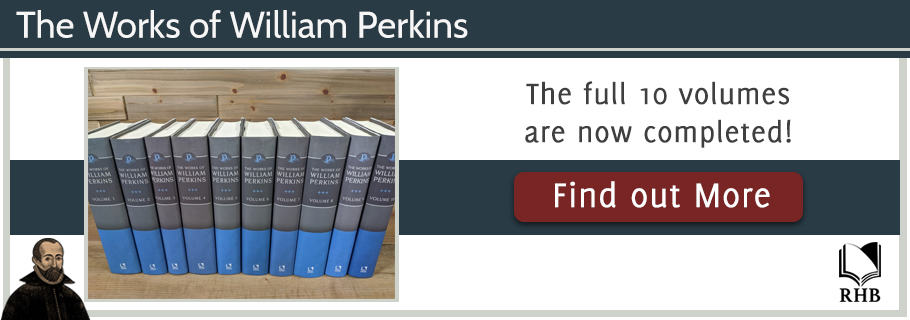This week the blog post is sponsored by Reformation Heritage Books and written by Dr. Joel R. Beeke.
The writings of England’s William Perkins (1558–1602)—who served God’s Church as one of the last of the sixteenth-century Reformers, as well as one of the fathers of the seventeenth-century Puritanism—has been finally reprinted in modern typeface by Reformation Heritage Books in 10 volumes. Contemporary scholars have called Perkins “the principal architect of Elizabethan Puritanism,” “the Puritan theologian of Tudor times,” “the most important Puritan writer,” “the prince of Puritan theologians,” “the ideal Puritan clergyman of the quietist years,” “the most famous of all Puritan divines,” and the “father of Puritanism.” They have classed Perkins with Calvin and Beza as the third in “the trinity of the orthodox.” Perkins was more widely published in England than Calvin, and the first Protestant theologian to have a major impact in the British Isles, Europe at large, and North America.
Here are some reasons why you should buy and read Perkins today: first, his life will teach you how to find comfort in the sovereignty of God, how to endure hardship in a sanctifying way, how to be ever engaged relentlessly in ministry and serving God for His glory, and how to balance unity and controversy in profitable ways.
Second, Perkins’s seasoned exegetical and systematic theology will teach you how to bow under and rejoice in the authority of God’s infallible Word, how to experience that God’s election is the friend of sinners, which gives us solid hope for salvation and produces holiness in our lives, and how to grow in having Christ fill our lives with Himself so that we can confess that for us to live is Christ (Phil. 1:21).
Third, Perkins’s pulpit ministry will help you to drink in the plainness of powerful exposition of God’s Word, how to employ a faithful hermeneutic in understanding the Scriptures, how to exercise a faithful ministry of continually applying the Word to yourself and others, and how and why you should value the faithful training of men for the sacred ministry.
Fourth, Perkins’s practical and pastoral theology will teach you how to bring your conscience to the touchstone of Scripture and walk in God’s ways, how to grow in experiencing a full and robust degree of assurance of salvation through trusting in Christ and His gospel promises, and by discerning fruits of saving grace in your own life by the Holy Spirit witnessing with your spirit that you are a child of God.
For these reasons and many more, Perkins’s complete works have been published by Reformation Heritage Books for the first time since the seventeenth century. Volumes 1–4 cover his exegetical works (my favorites here are his expositions of the Sermon on the Mount, his commentary on Galatians, and his exposition of Hebrews 11 and Jude); volumes 5–7, his doctrinal works (the classics here are his Golden Chain on salvation and his writings on predestination); and volumes 8–10, his practical works (his works on conscience, assurance of faith, repentance, governing the tongue preaching, vocation, and living and dying well are priceless).
In sum, Perkins’s Works are a gold mine of biblical, Reformed, Puritan, confessional, experiential, and practical truth. Reading them will enlighten your mind, prick your conscience, and allure your heart to fall more in love with Christ. Pray with us that a great harvest will be reaped from the reprinting of William Perkins’s complete works in the twenty-first century all around this needy globe through the maturation of the saints, the salvation of the lost, the building up of Christ’s Church, and the greater glory of God Triune.










